-
Genealogy & Names
-
Tourist Information
-
Culture & Reference
|
Apr 2021 
Irish Hillside Image from Free Photos Of Ireland |


find out more |

| Popular Articles from Recent Newsletters: |


|
The recent introduction of a Mandatory Hotel Quarantine system for inbound travelers to Ireland has been met with a very mixed reaction. The overarching feeling among Irish people is that the quarantine system is a year too late. 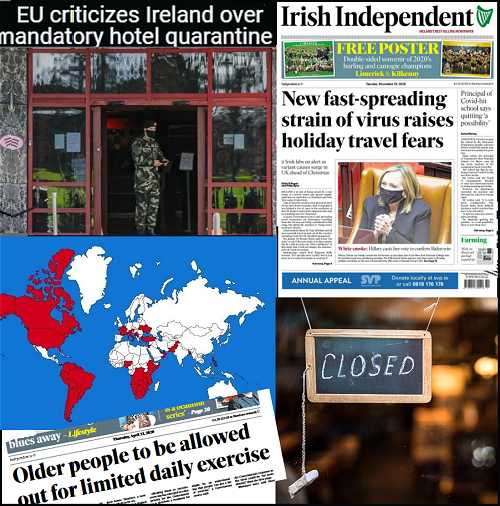
As far back as April of 2020 there were loud calls to at least monitor visitors, if not to shut down access to the country all together. The calls fell on deaf ears and travel via Dublin airport continued pretty much without interruption. A voluntary system of self-isolation at home had about as much effect as could be expected. So, it was with a shrug of Irish collective shoulders that the Mandatory Hotel Quarantine system was introduced in late March 2021, imposing a fee of 1875 Euro (over 2260 US dollars), for 1 adult in 1 room for 12 nights. All inbound travelers from designated countries were required to stay at an appointed hotel. Some made a run for it, only to be returned to the hotel. The European Union expressed concern at the program whilst some legal minds in Ireland pondered if the 'imprisonment' (too harsh a word?), of Irish and foreign visitors was even legal or constitutional. When the country entered the 'third wave' of Covid-19 shortly after Christmas, the Government were roundly criticized for relaxing restrictions too soon (having been roundly criticized beforehand for not relaxing restrictions sooner). Once a new lockdown was imposed in January the Government led by Michael Martin (Fianna Fáil) and Leo Varadkar (Fine Gael), seemed determined that it should be the final one. Schools were closed, retail shops were closed, pubs and hotels were closed, house-parties and gatherings were banned. The big gamble was on the Vaccines. Availability continues to be an issue but to be fair, at the time of writing over 1 Million people in the country have now received at least a first dose of an approved Vaccine with the hope that 70%+ can be vaccinated by the end of June. So where does this leave visitors to the Emerald Isle? Currently if you visit the country from one of the list of designated states (including the United States and Canada as at 28th April 2021), then you will be required to spend up to 12 nights in a hotel, at your own expense. And even if you are from a non-designated country then you will be required to self-isolate for 2 weeks at your own nominated location. There are some exemptions and limitations so it is important to check in advance. There is talk at the moment of waiving the quarantine restrictions for those people who can prove that they are Vaccinated. Similarly the European Union (EU) is working on a 'digital green certificate' that would allow Vaccinated travelers to visit and traverse the EU unfettered. The common sense advice is this: Dont visit Ireland at the moment (April 28th, 2021). If you are planning a trip in the future be aware of the current advice at the Irish Government Web Site and do realize that the situation is very volatile and subject to change. Caveat emptor. That being said there is real hope in Ireland that foreign travel into and out of the country may be able to commence in earnest from July/September onwards. Although the sneaky disease that we have come to know as Covid-19 could yet scupper all of our immediate hopes and plans. Again. |

|
||||

|
note: Labhraidh Loingseach is pronounced 'lao-ree linn-shock'. Labhraidh Loingseach was a famous High King of Ireland and was the ancestor of the people of Laighin, from whom the Province of Leinster took its name. He was revered as a 'God among the Gods' in early poetry as is most remembered as the King who had horse's ears. 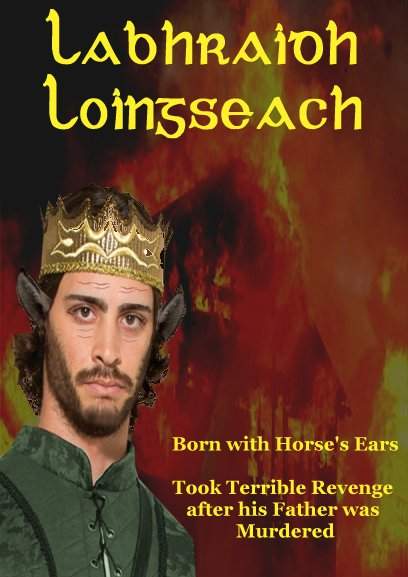 His grandfather was King Lóegaire Lorc who was treacherously killed by his brother Cobthach Cóel Breg, as was his own father Ailill Áine. Such was the incredible nature of the means of shaming in ancient Ireland that the young son who had survived was forced to eat a piece of his own father's and grandfather's hearts, and also to swallow a mouse!
His grandfather was King Lóegaire Lorc who was treacherously killed by his brother Cobthach Cóel Breg, as was his own father Ailill Áine. Such was the incredible nature of the means of shaming in ancient Ireland that the young son who had survived was forced to eat a piece of his own father's and grandfather's hearts, and also to swallow a mouse!
Needless to say, the young child was traumatized by this treatment and became a mute instantly, known thereafter as 'Móen Ollom', meaning 'the mute scholar'. When older he was engaged in a game of hurling when he was injured. He cried out 'I am hurt' and from that time became known as 'Labhraid', meaning 'he speaks'. The ancient 'Lebor Gabála' recalls that after being exiled for thrifty years Labhraidh Loingseach returned and took his revenge on Cobthach. After a bloody war he hatched a plan and invited Cobhtach to attend his newly built fort at Dind Ríg. But this was no ordinary fort. It had been specially constructed from iron and had taken years to complete. Cobthach was suspicious and insisted that Labhraidh's own mother should also enter the great building at the same time that he did, effectively as a hostage. The trap was set and when the banquet had been consumed the iron fort was shackled with an enormous chain. Escape was impossible. Piles of trees were stacked against the iron walls. Using 150 huge bellows the iron fort was set alight in a terrible all-consuming flame. Cobtach and all within perished, including Labhraidh's mother, who had implored her son to continue with the plan, sacrificing herself in order to take her own revenge on her husband's murderer. Labhraidh Loingseach was now the High King of Ireland and became famed for his hospitality and wisdom. But he still kept a close secret, one that could yet topple his reign. For a King to have any kind of physical impairment in ancient Ireland would surely exclude him from keeping his crown. Incredibly, under his mass of hair he possessed two large horse's ears! Labhraidh was extremely careful to keep his secret. Every year he would summon a barber to cut and groom his hair and then that barber would be put to death. So it was that those of that profession lived in constant fear of being called to the Court, lest they too should suffer the purpose of a sword. A widow whose only son was a barber was distraught to learn that her son had been ordered to visit to King for his annual haircut. She begged Labhraidh to spare her son and he was so moved by her impassioned pleas that he agreed that her son would be spared, on strict condition that he kept the royal secret forever. The deal was struck and the young man carried out his duties, overcame his amazement at finding horse's ears growing from the royal head and gratefully left for home once his duty had been done. But this was a terrible burden to bear. The young man was deeply troubled by what he had learned and yearned to be free of his obligation. Such was his distress that he fell very ill. A Druid was summoned. The Druid advised him to go out into a forest, and to find a fine tree and to utter his secret in its fullness to the tree, at which moment he would recover. If there is one thing Druid's know abut then it is trees so the barber arrived at a forest, selected a fine Willow tree and revealed his amazing tale in that quiet place. Instantly he felt better. The weight pressing down on his entire body was lifted, his mind cleared and the foggy haze that had clouded his brain was lifted. He gleefully returned home to his mother. Soon after this time the Harper at the court of King Labhraidh, named Craiftine, was in need of a new Harp. He traveled though every nearby forest until he finally found a tree suitable for his purpose. He had found the same Willow the young barber had told his tale to and from it took a perfect piece of wood he needed. Over the weeks and months that followed he fashioned the wood into the precise shape he required. Polishing the beautiful Willow again and again he finally affixed the strings to complete the Harp, completing the beautiful instrument in time for a banquet to be held at the Court. The King summoned Craiftine and ordered him to play. He did as instructed and soon the beautiful musical notes filled the chamber. But there was more than just music emanating from the Harp. There was a repeated phrase being uttered. An incredible and unmistakable chant over and over again: 'Labraid Loingseach has horse's ears. Labraid Loingseach has horse's ears. Labraid Loingseach has horse's ears.' The Court was dumbstuck. There was silence in anticipation of the Kings response. Craiftine feared the worst, certain that he would be put to death for such an insult. But even High Kings are mortal, and occasionally humble. The guilt of murdering a succession of barbers in order to conceal his own secret had weighed heavily on Labhraidh. He parted his hair to reveal the truth. That he did indeed have horses ears! And just as the young barber he had spared was freed from his burden so too was the High King of Ireland freed from his terrible guilt and shame. He waited for the ridicule and for the laughter to begin. But to his amazement the assembled crowd in the court neither laughed nor jeered. Instead they stood dumbstruck in observance of their King, who was now all the more amazing to them for the fact that he bore horse's ears! From that time on Labhraidh Loingseach wore his ears in full view. By revealing his true self he had instantly felt better and swore that he would never again repeat his mistake. And from that time on the barbers of the kingdom could sleep a lot easier. No longer were they afraid of the King with horse's ears. |


find out more |

|
The Cunningham children went to St. Camillus Catholic School in the small town of Dale River, located in upstate New York, about 90 miles north of Manhattan. There were seven of them. The oldest, Frances, was born in 1950 and the youngest, Elizabeth, was born in 1960. In between there was Thomas, Bernadette, Joseph, Patricia and Anne. Mrs. Cunningham's right hip had a child on it almost daily for the better part of 10 years, and as a result she walked with a sort of lopsided gait, where her hipbone protruded a bit. 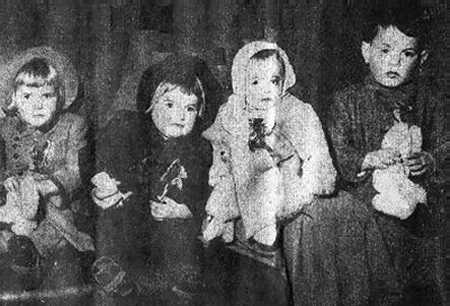 The only time Mary Agnes Cunningham was off her feet was when she was sleeping. Mealtimes meant popping up and down from her chair to retrieve one thing or another, and her days were spent in a flurry of constant motion, from washing machine to clothes line to sink to stove to bedmaking, to endless diaper changing and bottle feeding.
The only time Mary Agnes Cunningham was off her feet was when she was sleeping. Mealtimes meant popping up and down from her chair to retrieve one thing or another, and her days were spent in a flurry of constant motion, from washing machine to clothes line to sink to stove to bedmaking, to endless diaper changing and bottle feeding.
St. Camillus taught grades 1st through 8th, which meant there were always at least three to four Cunningham kids in school at the same time. When they finished 8th grade, the children went to Dale River's public high school because the town had no Catholic school beyond 8th grade. This was a disconcerting topic in their Irish Catholic household, where every nook and cranny had statues of the Blessed Virgin Mary, and Jesus Christ hung on the cross over every bed. Mrs. Cunningham would often reference the Lord's name to any recalcitrant child by admonishing, 'ye are a bother to Christ on the cross, ye are.' Mrs. Cunningham cleaned the convent, located next to the school that the students attended Monday through Friday, except for Holy Days when school was closed and they basically spent the day in church. The school also dismissed at noon every Wednesday so the public-school children could come to learn about Jesus Christ and all that entailed. Mr. Cunningham did whatever carpentry was needed in the parish, which was an open-ended chore dependent upon the whims of the nuns and priests, who Mr. Cunningham swore had nothing better to do than look for trouble in the aging brick and mortar of their parish. The Cunningham's did not dust and vacuum and tinker and hammer nails into old pews because they were bored out of their minds and had nothing better to do. They did it as a bartering agreement for a discount on the $200 per year per child tuition. It was the only way they could manage to send their children to St. Camillus on Mr. Cunningham's earnings as a carpenter. There was never a question of sending the children to Dale River's public elementary school. Mary Agnes and Jack Cunningham were born and raised in Ireland, where the only education was a Catholic one. Were they to send their children into the devil's den of a public school, where they might hear that Jesus Christ was just a nice guy and not our Lord and Savior, it would have doomed the entire family to the pits of hell, or purgatory at the very least. However, by the time they finished 8th grade at St. Camillus and entered Dale River High, the children were well shielded by the sacraments of baptism, confession, communion and confirmation. Jack told each child when they headed out to the first day of high school, 'ye are to keep yer head down when they desecrate the Lord or I'll knock yer ears out.' For the Cunningham children, public school was a freedom like no other. They lived for 9th grade, when you could go an entire school day without reciting daily rote prayers while wearing itchy, ill-fitting uniforms, and endlessly pondering original, mortal and venial sins. Every Wednesday, they watched with envy as the public-school children headed into St. Camillus in their jeans and sneakers for the religious instruction that would save their mortal souls. They were in awe of these children, who seemed unfazed by the nun's disapproving tongue clucking over their clothing, and who practically yawned their way into the school with the bored air of wasting time on such nonsense as the proper placement of clasping hands together in prayer. Mr. Cunningham made bible stands for the altar, as well as doing carpentry jobs around the parish, which was comprised of two school buildings, one rectory, one convent and one church. It was always a tricky thing when the nuns summoned one of the Cunningham children to her imposing desk to ask their father to complete some work in the parish. The request usually came on a Friday before the final bell. The nuns must have been contemplating the look of the church for Sunday masses. The Cunningham child then had to weigh out the best time to approach their father with the nun's request. It was usually better to wait until the last minute because they knew the request would not bode well, and why hear about it all weekend long. The problem was that the last minute always seemed to come just as Bonanza started. This was the only time their father was finally able to relax and he didn't want a word spoken as Hoss and Little Joe lit up the screen of their black and white television, perched on an old card table, with rabbit ears that needed constant tending by the child sitting closest. The unluckily chosen child would sidle up to the armchair and tap their father on the shoulder. 'Dad, Sister Finola wants you to build a new bible stand. She said the one on the altar is beyond grace.' All eyes were on Mr. Cunningham when he generally said something like, 'those sons a bitchin nuns never give a man a moment's peace, for the love of God.' The entire household held their breath..... and Mrs. Cunningham crossed herself several times. Then Bonanza started. Mary Agnes and Jack Cunningham immigrated from Ireland in the 1940's. They were a postcard picture of the Emerald Isle. Like their seven children, both had deep set blue eyes and ivory skin. Jack had a full head of dark black hair that made his blue eyes even more striking. He always had a perpetual look of exasperation on his well weathered face. It was as if he spent his days waiting to hear that another thing needed fixing or an unpleasant request was only minutes from someone's lips to his ears. He usually walked in the door each evening with his eyes scanning the trouble-maker to admonish for the catastrophe that only he could resolve. Mary Agnes, in contrast, never expected the worst because she was always a rosary prayer away from the Lord's help in any trouble that could befall their large family. Religious to her core, Mary Agnes found not only obligation and solace in Sunday mass, but utter joy and contentment in the presence of priests who bestowed God's Holy Words, along with the sacrament of communion, all while dressed in freshly starched vestments. When the children became adults and reminisced on mass, they all agreed that their mother's joy in church was mostly about the peace and quiet required at mass, where her children were terrified to fuss and fidget for fear of a nun's wrath come Monday morning. Mrs. Cunningham was finally able to close her eyes and not worry about a spill, a scream or a hair pull. While Jack had a full head of dark hair, Mary Agnes was a red head with soft curls that never needed tending. They just flowed to her shoulders like a stream, and when she took her hair down at night, the children hardly recognized their mother. She was a younger, more beautiful version of herself, and they begged her to wear her hair down during the day. Her response was always the same: 'and how would the Sisters of St. Ursula like to see me coming to their convent looking like an Irish tart?' Then, from their father: 'better an Irish tart than a Mullingar Heifer.' The children finally learned, after countless times asking, that a 'Mullingar Heifer' referred to the large legged and unattractive Heifer cows that roamed the couple's hometown of Mullingar. The term 'Mullingar Heifer' was slang to describe 'not so pretty' girls. How the Cunningham's ended up in a small upstate town was a bone of contention. When Mary Agnes and Jack arrived on the SS America to Manhattan, they were sponsored by Mary Agnes' uncle, Father Martin Flynn, God Bless his Holy Departed Soul (cross yourself at least once when his name was mentioned). Mr. Cunningham wanted to leave the growing high rises and bustling streets of Manhattan to come to a place 'more like home.' Mrs. Cunningham missed the high rises and bustling streets of Manhattan, where you could push a stroller of children down the street for a malted milk shake while they slept outside the ice cream shop. When the subject arose, Mrs. Cunningham would sigh and look over at Mr. Cunningham from the stove. 'Why in the name of the Lord Jesus Christ would I come to America to still be in Ireland?' Well, there really was no answer to this, as all the children eventually learned, and simply returned to their plates of food. Mr. Cunningham stomped out the door, in search of placating a wicked thirst at O'Reilly's Bar and Grill, with its unfortunate location across the street from the Cunningham household. The Cunningham's were renters. This was not typical for families who attended St. Camillus school. Most of the private school students lived in one-story ranch houses located just outside the town limits or in well-established neighborhoods around the town. The Cunningham's lived smack in the middle of the business district in a large apartment over a florist shop. As an independent carpenter, Mr. Cunningham's work was intermittent and most earnings went to the food and clothing of his 7 children. Much as they tried, Mary Agnes and Jack just could not save enough for a down payment on a house. It was their dream, and they spent endless nights over tea at the kitchen table, with one of the many marbled notebooks the children left everywhere, calculating how to save enough money for a house, all to end the night with large sighs and resignation as renters. In Ireland, tradition dictated that land was handed down from the oldest deceased male to the oldest living male, which left Mary Agnes out from any possible succession of land in her family. Jack was just too far down on the list of his brothers to ever be in the running. It was one of the reasons they came to America, where they might work hard enough to buy a house at a reasonable price, with a bit of land. Jack's oldest brother, Patrick, owned the land his father left, and was forever lauding it in the faces of whatever brother he was in conflict with at any given time, for any unknown reason. There were many 'Irish grudges' in the family, where you could be mad at someone for years, with the reason long lost and no longer even important. To break the grudge, however, would require a turning of the cheek that was not within the stubborn Irish nature. Patrick was the very definition of an Irish grudge, and he held onto it like a cherished gift. Little did he know that it was actually a relief to be on the receiving end of his grudges. It meant you no longer had to sit and endure his endless pontificating about Sinn Fein, the English and the Catholic church, or fetch him this and that as he sat like a king in the middle of your kitchen on a long weary visit. A bachelor, who basically swore off women, Patrick was more content living alone on the family farm with his cows and harmonica. He was a miserly man who was convinced that any marriage would be the ruin of his fortune. While the Cunningham's apartment was large, two of the most frequently used rooms, the bathroom and kitchen, were the smallest. The first thing a visitor noticed upon arrival was the one bathroom located directly across the hall from the entrance to the apartment. There was rarely a time that a child wasn't sitting on the toilet or being scrubbed in the tub, with the door wide open. Closed doors were useless in the Cunningham household since someone was forever barging in for one reason or another. In order to accommodate all the kitchen seating required, Jack constructed a vented wood cover over the radiator. The table was placed in front of it, where at least three of the seven children sat for meals, while the rest of the family gathered around in shoulder-to-shoulder chairs. During the winter months, they were forever running for a blanket to cover the steaming heat that came out of the whistling radiator. The apartment had a large living room that led to a long hallway, off which were four bedrooms. The hallway had hardwood floors, and the children would slide down them until the inevitable splinter stopped them in their crying tracks. Mrs. Cunningham had no sympathy or patience for the victim, saying: 'did I not say ye would soon be cryin, did I not?' The occupancy of each bedroom was carefully arranged to accommodate the gender and age alignments of the children, as well as the overall need for a peaceful night's sleep. The boys, including Mr. Cunningham, shared one bedroom, while Mrs. Cunningham shared a room with whoever the baby was at the time. The three youngest girls shared a room, often with much discord, while the two older girls had a bedroom to envy by their little sisters. For the Cunningham children, who lived through colicky babies, the reason for their parents separate bedrooms made perfect sense. Mr. Cunningham simply needed a decent night's sleep. Without it, he would be useless to work the next day and the family would surely starve. For the Cunningham parents, separate bedrooms gave them a fighting chance against another mouth to feed. Meals were a cacophony of whatever new and left-over food Mrs. Cunningham and her oldest daughters rustled up. The only given at every meal was potatoes. They were served mashed, boiled, or baked. When pasta was introduced into the household by Frances, she tried to convince their mother that potatoes were no longer necessary. The argument fell on deaf ears. As far as Mrs. Cunningham was concerned, potatoes were as much a staple as salt and pepper. This led to meals that included spaghetti with meat sauce, along with heaps of potatoes and canned peas. Cereal was a long-abandoned luxury. Mrs. Cunningham quickly found that, as Thomas and Joseph grew, they filled and re-filled mixing bowls with whatever cereal was on sale that week, and ate it as their after-school snacks, which left nothing for breakfast the next day. Tea, toast and oatmeal became the weekday morning meal. Sunday breakfasts were a special treat. Once the family was home from mass, Mrs. Cunningham donned her well-worn apron while Mr. Cunningham picked up the twelve hard rolls and sweet buns on permanent weekly order from Rehers Jewish bakery. Mrs. Cunningham cracked eggs and fried bacon, while the children waited their turn, plates in hand at the stove. Sunday breakfast was the quietest meal in the Cunningham household. There was just too much pleasure in those sweet buns and bacon for any cross talk or fighting to erupt. While the Cunningham children had much less than most of their classmates, they were revered for the one thing that was envied in a town with more Irish households than any other in their upstate area. The Cunningham children were first generation Irish. Practically every nun and priest in St. Camillus parish had Irish ancestry, and well over 80% of the children who attended the school were 2nd and 3rd generation. The city itself was named after a small village in Ireland. The children enjoyed their role as Ireland's Ambassadors simply by having immigrant parents. When their aunts and uncles from 'the other side' visited, several who were nuns and priests, the family became local celebrities. Interpreting their parent's thick Irish brogues was also a highlight for their friends. Words like 'filum' meant 'film' and 'amint ye' meant 'aren't you,' When their father said, 'go get me the yoke from the closet' it could mean any number of things, but the correct item was always delivered to his callused hands. Contrary to being embarrassed by their parent's brogues, the children were proud and amused to be translators for their friends. Like many other large families, the Cunningham children developed a natural division based primarily on age. There were two subsets. The four older siblings formed one alliance, while the three younger ones formed another. The older subset included the first born, Frances, followed by Thomas, Bernadette and Joseph. The younger subset included Patricia, Anne and Elizabeth. As the first-born girl of five girls, Frances set the tone for hair and fashion. To this day, the older subset insists that their younger siblings were spoiled rotten, while the younger siblings retort that they were simply ignored by weary and older parents. Not only ignored, they argued, but never even acknowledged with a baby picture. Large portraits of Frances and Thomas, in fancy dresses and little suits, hung prominently from the living room walls, while a few smaller and less ornate photos hung of Bernadette and Joseph. Any photos of Patricia, Anne and Elizabeth were taken on 'school picture day' and delegated to the kitchen drawer with the scotch tape and old batteries. Anne, the sixth born, was forever dismayed by the younger siblings lack of prominence on their walls. 'Did you lose the camera or what?' she would ask time and again. Mrs. Cunningham just took a long Irish inhale and returned to her sewing. Mr. Cunningham simply responded, 'are ye not just happy to be here, that ye need a picture to prove it?' Anne was left openmouthed and bewildered by his response, which silenced her for the time being. That the Cunningham's were poor was a given. What they were not was 'shanty Irish poor', as their mother often reminded them. 'Ye may leave this house in hand me down clothes, but ye will never leave it dirty. Now get yerself in that tub.' The very idea of a newly purchased piece of clothing when hand me downs were readily available was not a discussion worth having. When the older kids wanted something, they used their money earned from odd jobs. The boys were 'shoe shiners' in the local bar and grille and the girls were well known baby sitters. While they had little money to spare, Mr. Cunningham always found the wherewithal to take the family on a summer trip to 'Little Ireland' in the Catskills, where small motels and cabins with names like 'O'Malley's' and 'Shaw's' spotted the area. New York City's Irish families came in droves for the music, food, and comradery of their native land. The Cunningham children had the time of their lives during this summer week. They would wake at the crack of dawn in a small rented cabin, where sleeping bags and cots covered most of the living area. Their days were spent in and out of the lake that surrounded their cabin site. Mrs. Cunningham sent them out with bologna sandwiches and apples, and her instructions were: 'now, don't ye dare come back till supper unless ye are bleedin.' While all the children, with the exception of the baby and toddler, spent their days swinging from a rope into the clear lake and roaming the nearby woods, their parents relaxed and visited with new and old Irish friends from New York City. They reminisced about 'home' and exchanged news of who was living, who was dead, and who was disgraced in one way or another in their little towns and villages. There was always an Irish fiddle and bodhran player to entertain from afternoon into the summer evenings. When the children returned home after an exhausting day in the water and woods, their pale Irish skin was usually pink and hurting. Mrs. Cunningham kept a large tub of Noxzema for just this occasion. The children would lay out all over the cabin while their mother slathered the cool cream on their sunburned bodies. Throughout the night, whenever a child woke up from the sting of the sun they would call out, 'mom, more zema please.' By the weeks end, their skin would be a bit tougher, but never tanner. They would burn, peel, and usually burn again. Mr. Cunningham would laughingly say, 'tsin't the drink that's the curse of the Irish, but the sun.' When summer ended, Mrs. Cunningham set about ensuring that all the children had proper school clothing and supplies. Mostly it was a matter of handed down uniforms being washed and dried on the clothesline that hung from outside the kitchen window. The girls also had to have beanies for church ties needed to be resurrected from under beds and closet floors for the boys. Lunch had to be planned and executed carefully. The Cunningham children were 'walkers.' This meant that they not only walked to and from school each day, but also walked home for lunch. Mrs. Cunningham had to make sure that soup was in the pot or sandwiches lined up on the table. She kept a sink full of soapy water and each child took turns with a quick wash before sitting down to the ham sandwich or chicken noodle soup with saltines. The boys ran all the way home so they could be first to finish eating and watch at least half of Batman and Robin before running back to be on time for after lunch prayer. One crisp fall day, when Mrs. Cunningham was on her way home from taking Elizabeth and Anne for a walk in the stroller, she opened the mailbox to a telegram from Ireland. While the family had a telephone, many in Ireland did not, and urgent news was delivered via telegram. Well, of course, the first thought Mrs. Cunningham had was that someone had died. She was correct. Mr. Cunningham's oldest brother Patrick passed away when he was trying to deliver a calf and the disgruntled Heifer cow kicked him in the head. This was sad news indeed, and Mr. Cunningham was rightly upset when told upon his arrival home. While the children never met their uncle Patrick, they were sad to see their father grieve. In an attempt to comfort his father, Joseph hung his head and said: 'well dad, at least it was a Heifer cow and not one of the pretty ones who killed him.' That was all it took for Mr. Cunningham to snap out of his grief and laugh till tears fell. 'Ah, right ye are Joseph, right ye are', he replied, before heading out the door to O'Reilly's for a toast to his dearly departed brother. Several months after Patrick's death another telegram arrived for Mr. Cunningham. The telegram asked him to contact the solicitor firm of Garde and Garde in Mullingar in regard to 'the estate of Patrick Liam Cunningham.' When Jack read the telegram, his head reared back as if he was kicked by a Heifer cow. There should have been no question that the land went to Matthew, the next oldest Cunningham brother. Jack immediately sensed that Patrick's tendency for the Irish grudge had left things a holy mess within the expected order of land succession. If not, why would he be included in any discussion of the estate. Mr. and Mrs. Cunningham had the older children bring the little ones to the corner ice cream shop with instructions not to return until they were summoned from the apartment window. With a deep Irish inhale, Jack dialed the solicitor in Ireland. In the long way the Irish had of getting to the point, Jack spent several minutes answering questions about weather, politics and the economy in America, while Mr. Garde giving him unsolicited updates on all the small-town news in Mullingar. When Mr. Garde finally took a breath, Jack said: 'ah, now what about this estate business?' 'So, right, now', said Mr. Garde, 'we've an interesting situation here. It seems that your brother Patrick has left his entire estate to you instead of Matthew. As I'm sure you can imagine, every Cunningham from here and far has landed on me doorstep to contest the bloody thing.' Jack was holding the phone away from his ear so that Mary Agnes could hear the news. She blessed herself over and over again as she learned of the family rift. Once the call ended, they both sat heavily on the kitchen chairs and began to discuss the ramifications of accepting a large sum of money that should have gone to Jack's brother. The sum was close to $300,000 American dollars. It would not only allow them to purchase a house, but to start a college fund for their children. 'Tis your blood and your decision Jack' said Mary Agnes, 'we can live with or without the money.' 'Well, misses, I'll have to give this a good think' and with that, Jack headed across the street to O'Reilley's Grille. When Jack weaved in the door after midnight, Mary Agnes was waiting up for him, sipping a cup of tea at the table. She looked up at him and said, 'ah, go to bed Jack, yer in the jar, ye are.' Instead, Jack joined her at the table and told her he made a decision. It really wasn't difficult, Jack told her, because money could come and go but family was forever, and should they ever return to Ireland, he wanted to be welcome, for better and not worse. He would call the solicitor and tell him that he wanted the money split evenly among the five remaining siblings, including one sister. 'It's never been a fair lot to ye women, has it?' and with that Jack measured his way into the 'boys room' and slept the sleep of a contented man. After the estate of Patrick Liam McKinley was finally settled, each living sibling received approximately $60,000, less the solicitor fees. After much back and forth of letters to his siblings, and phone calls with the solicitor, the Cunningham clan were all satisfied with the resolution. The only man who would have objected was put to rest by a mad Heifer cow. Jack used his windfall for a down payment on a rambling Victorian house just outside of Dale River. It came with enough land for him to plant a garden or two, and finally have some room to breathe after a long day's work. Mrs. Cunningham was thrilled with the house, but even more thrilled when Jack bought her a new clothes dryer, which meant no straining to hang clothes on a line or chapped hands that no amount of Vaseline would heal. The moving truck arrived earlier than expected. Many boxes remained open as the Cunningham's filled them with a plethora of items collected over the 15 years they lived at 106 South Front Street. Mrs. Cunningham tried her best to purge things long forgotten, but one child or another would insist they couldn't live without it. When all the boxes were finally closed, and furniture was loaded, it was time to leave the only place the seven children ever really knew as home. The family roamed the empty rooms of an apartment that welcomed their births, echoed many tears and laughter, and held countless memories of this large chaotic family. You could hear a pin drop as the Cunningham children were hit with the realization that they would not return to a place that was always a welcome hearth after long school days. As if she could read their minds, Mrs. Cunningham said: 'Now children, these are just walls and floors. Home is our hearts, and we'll bless our new house with each of yours.' At this, Mr. Cunningham gruffly swallowed a lump in his throat and herded them all out the door. |

|
HOT CHOCOLATE The sweet elixir known as hot chocolate that is the love of children and adults the world over was actually invented by Hans Sloane (1660-1753), who was born at Killyleagh in County Down in Ulster. As a young man he studied Botany and Pharmacy in London. He travelled to Jamaica as a physician to the Governor of Jamaica, expanding his botanical knowledge greatly, recording over 800 new species of plant-life.  He noted that the local population would drink cocoa powder in water, a taste he found very displeasing but found a new way of enjoying the drink by mixing it with milk and sugar. He returned to England and it was not long before the famous Cadbury Brothers were selling 'Sloane's Drinking Chocolate', later known as 'hot chocolate' or 'cocoa'.
He noted that the local population would drink cocoa powder in water, a taste he found very displeasing but found a new way of enjoying the drink by mixing it with milk and sugar. He returned to England and it was not long before the famous Cadbury Brothers were selling 'Sloane's Drinking Chocolate', later known as 'hot chocolate' or 'cocoa'.
THE ELECTRON To say that an Irish man invented the Electron and therefore one of the fundamental atomic particles that make up the entire Universe is perhaps pushing it a little bit! But the term 'electron' was actually coined by the Irish Physicist George Johnstone Stoney (1826-1911), who as early as 1874 had determined that there was a fundamental unit quantity of electricity. In 1891 he combined the words 'electric' and 'ion' to create the word 'electron'.  Stoney was born near Birr in County Offaly, home to the world's largest telescope, the 72-inch Leviathan of Parsonstown, built by the 3rd Earl of Rosse. He worked there as an assistant to William Parsons in what was proving to be a hotbed of scientific discovery in Ireland. He published 75 scientific papers during his lifetime, contributing much to the knowledge of cosmic physics and to the theory of gases. He is honored by craters on both Mars and the Moon being named for him.
Stoney was born near Birr in County Offaly, home to the world's largest telescope, the 72-inch Leviathan of Parsonstown, built by the 3rd Earl of Rosse. He worked there as an assistant to William Parsons in what was proving to be a hotbed of scientific discovery in Ireland. He published 75 scientific papers during his lifetime, contributing much to the knowledge of cosmic physics and to the theory of gases. He is honored by craters on both Mars and the Moon being named for him.
HORSE-RACING The racing of horses over fences is known as 'National Hunt Racing' and originated in Ireland in the early eighteenth century. The original 'pounding races' involved cross-country treks where the animals were required to jump over ditches and hedgerows and whatever other obstacles they met along the way.  A very early record of such a race is from the year 1752 and records a race between Buttevant and Doneraile in County Cork, some 4.5 miles, about the same distance as the modern 'Grand National' race at Aintree. Together with the 'Gold Cup' at Cheltenham these two races form the pinnacle of the National Hunt Racing calendar.
A very early record of such a race is from the year 1752 and records a race between Buttevant and Doneraile in County Cork, some 4.5 miles, about the same distance as the modern 'Grand National' race at Aintree. Together with the 'Gold Cup' at Cheltenham these two races form the pinnacle of the National Hunt Racing calendar.
The race in Cork was marked at the start and finish by a Church and it is thus that the term 'steeplechase' was born. RADIOTHERAPY The Irish physicist John Joly (1857-1933), is renowned for his invention of Radiotherapy and in particular for its use as a treatment of Cancer. Born in Holywood House in County Offaly he was educated in Trinity College and contributed over 270 books and papers during his lifetime. His 1899 paper 'An Estimate of the Geological Age of the Earth' was revolutionary at the time and although later superseded by more accurate estimates it was noted for breaking new ground.  In 1914 he developed the use of Radium in the treatment of Cancer. He helped establish the 'Irish Radium Institute' that promoted the 'Dublin method' of using a hollow needle for deep Radium treatment, and it was from here that the modern treatment know as 'Radiotherapy' was developed. This prolific man also invented the 'Joly Colour Process', allowing for the production of colour photographs. A crater on Mars was named for him to honor his many scientific achievements.
In 1914 he developed the use of Radium in the treatment of Cancer. He helped establish the 'Irish Radium Institute' that promoted the 'Dublin method' of using a hollow needle for deep Radium treatment, and it was from here that the modern treatment know as 'Radiotherapy' was developed. This prolific man also invented the 'Joly Colour Process', allowing for the production of colour photographs. A crater on Mars was named for him to honor his many scientific achievements.
SEISMOLOGY Anyone who has ever experienced an earthquake or tremors will have become instantly aware of the power of the planet we all live on. The study of these forces is called Seismology and it was the Irish scientist and inventor Robert Mallet (1810-1881), who was the pioneer of this field of study.  Born in Dublin and educated at Trinity College the young Mallet joined his father's iron foundry and provided engineering iron to projects such as the Fastnet Lighthouse and a swing-bridge over the River Shannon. His 1846 paper to the Royal Irish Academy titled 'On the Dynamics of Earthquakes' is considered to be one of the fundamental studies giving rise to the new science of Seismology. He is credited with coining not just the word 'Seismology' but also 'epicentre'. His 'Report on the Great Neapolitan Earthquake of 1857' when over 11,000 people had lost their lives in the Italian city of Padua was very highly regarded.
Born in Dublin and educated at Trinity College the young Mallet joined his father's iron foundry and provided engineering iron to projects such as the Fastnet Lighthouse and a swing-bridge over the River Shannon. His 1846 paper to the Royal Irish Academy titled 'On the Dynamics of Earthquakes' is considered to be one of the fundamental studies giving rise to the new science of Seismology. He is credited with coining not just the word 'Seismology' but also 'epicentre'. His 'Report on the Great Neapolitan Earthquake of 1857' when over 11,000 people had lost their lives in the Italian city of Padua was very highly regarded.
WHISKEY The distillation of alcoholic liquid from fermented grain mash has been documented as far back as the Babylonians four thousand years ago. But the moment the word Whiskey came into being is actually pinpointed as being the year 1405 in the 'Annals of Clonmacnoise' of Count Offaly, in the very heart of Ireland. The word 'Whiskey' is an expanded anglicized form of the Irish word 'uisce' meaning 'water'. The Gaelic words for Whiskey are 'uisce beatha' meaning 'water of life'. Uisce is pronounced 'ish-keh' so it is easy to see how this could transform into the modern pronunciation of Whiskey that we know today.  When enjoyed in moderation Whiskey is savoured and highly regarded but easy does it! Perhaps some caution should be taken from the earliest reference of the drink from Clonmacnoise. The mention in the Annals of that famous Monastery record how the death of a Chieftain had occurred at Christmas due to 'taking a surfeit of aqua vitae'. He drank too much, and succumbed.
When enjoyed in moderation Whiskey is savoured and highly regarded but easy does it! Perhaps some caution should be taken from the earliest reference of the drink from Clonmacnoise. The mention in the Annals of that famous Monastery record how the death of a Chieftain had occurred at Christmas due to 'taking a surfeit of aqua vitae'. He drank too much, and succumbed.
|

View the Archive of Irish Phrases here: http://www.ireland-information.com/irishphrases.htm |

|
The winner was: vcaburke115@aol.com who will receive the following: A Single Family Crest Print (usually US$24.99) Send us an email to claim your print, and well done! Remember that all subscribers to this newsletter are automatically entered into the competition every time. I hope that you have enjoyed this issue! 
by Michael Green, Editor, The Information about Ireland Site. https://www.ireland-information.com Contact us (C) Copyright - The Information about Ireland Site, 2021. 17 Páirc Ghrainbhil, Carraig Dubh, Contae Baile átha Cliath, Ireland Tel: 353 1 2893860 |

|
MARVELOUS GIFTS FOR ANY OCCASION FREE DELIVERY TO YOUR DOOR 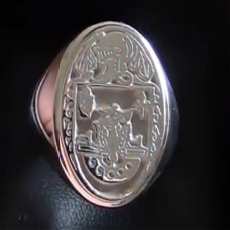
BIG REDUCTIONS! Stunning Family Crest Signet and Seal Rings 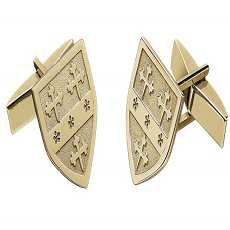
DISCOUNTED FOR A LIMITED TIME Elegant Cufflinks 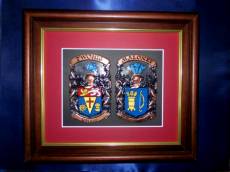
Incredible Family Crest Plaques Made in Ireland 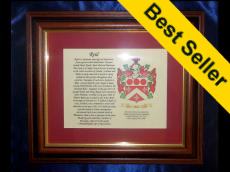
Superior Framed Family Crest Parchments 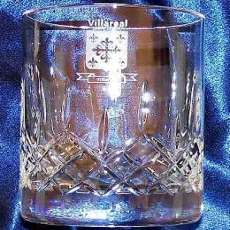
Gorgeous Glistening Galway Crystal 'Your-Name' Old Irish Sign NEW DESIGNS! 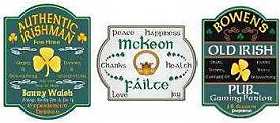
From US$34.99 - Free Delivery 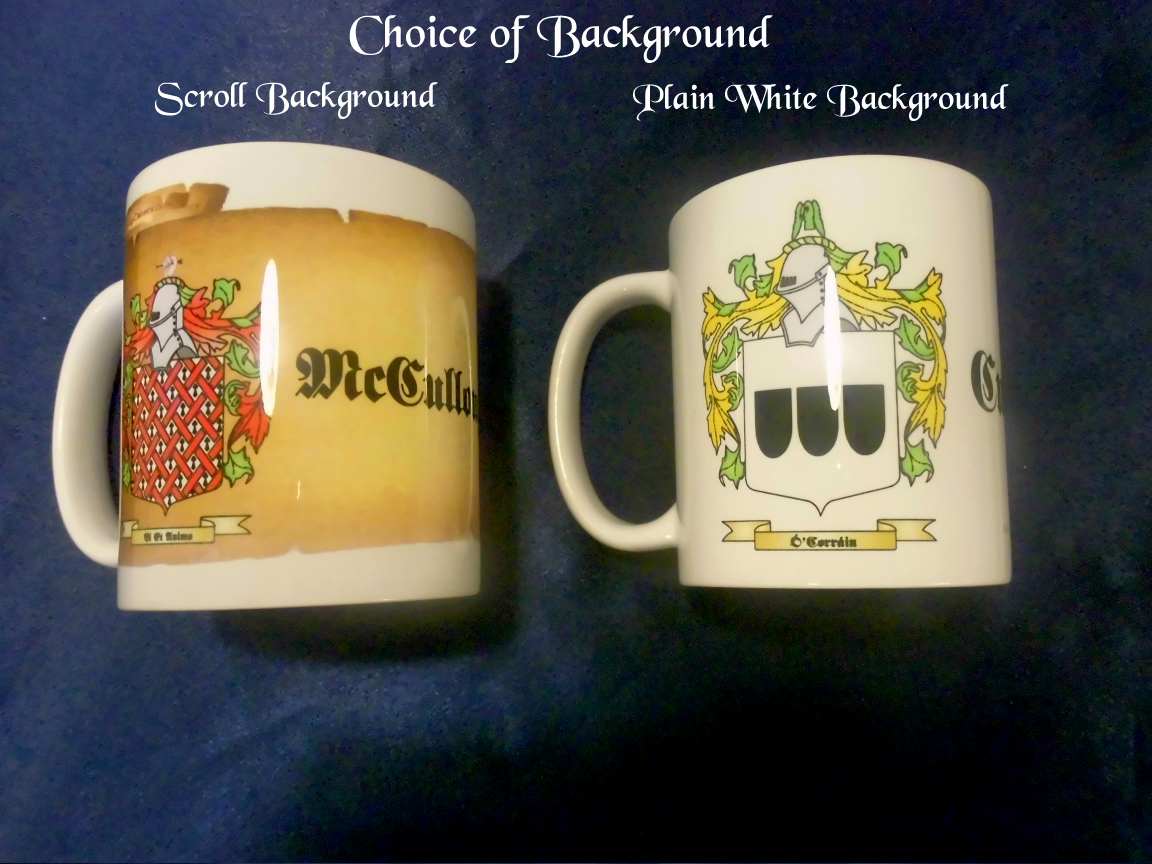
New Designs available on our Coffee Mugs 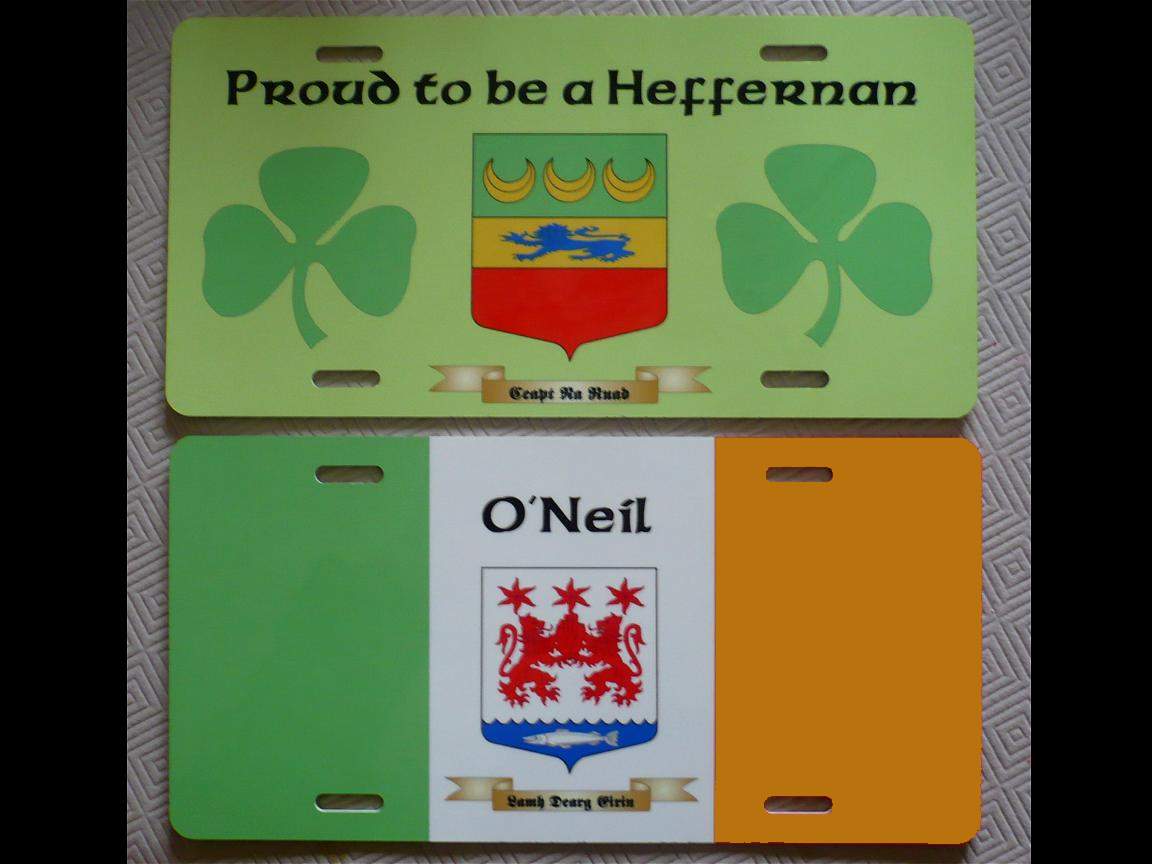
Personalized Licence Plate 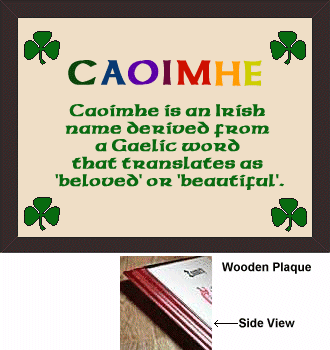
Personalized First Name Plaque. Great for Kids! 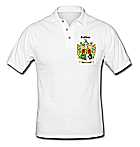
'Your-Name' Polo & Tee Shirts 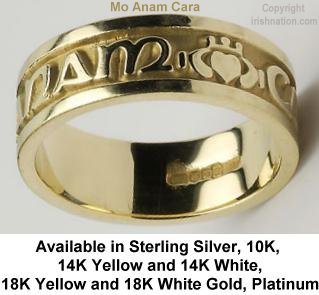
From US$69 Delivered BIG REDUCTIONS! Stunning Engraved Rings from Ireland with Irish Language Phrases. Mo Anam Cara: My Soul Mate Gra Dilseacht Cairdeas: Love, Loyalty, Friendship Gra Go Deo: Love Forever Gra Geal Mo Chroi: Bright Love of my Heart SEE MORE GREAT OFFERS AND DISCOUNTS AT: IRISHNATION.COM FREE DELIVERY FOR A LIMITED TIME! |
